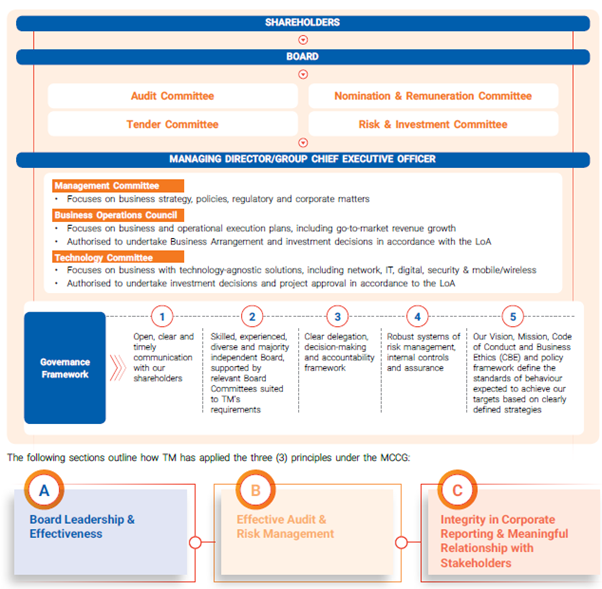OUR GOVERNANCE MODEL AND FRAMEWORK
TM’s Governance Framework is crafted according to the rules, requirements and provisions laid out in the following documents:
- Companies Act 2016;
- Main Market Listing Requirements (Main LR) of Bursa Malaysia Securities Berhad (Bursa Securities);
- Malaysian Code on Corporate Governance (MCCG) issued by the Securities Commission Malaysia (SC);
- Corporate Governance Guide published by Bursa Malaysia Berhad;
- Guidelines on Conduct of Directors of Listed Corporations and their Subsidiaries issued by the SC; and
- International best practices and standards on corporate governance.
As part of the Group’s Governance Framework, specific responsibilities are delegated to the relevant Board Committees and Management Committees, providing support to our Board in key areas such as financial review, human capital management, internal control and risk management, as well as governance, procurement and sustainability matters.
TM’s Governance Framework is supported by the Board Charter, Limits of Authority (LoA) Matrix, Business Policy and Governance (BPG) and the recently approved Directors & Management’s Conflict of Interest Policy (COI). An annual review of the Board Charter is conducted, whilst the LoA and BPG are reviewed and updated in line with the Group’s internal reorganisation and transformation initiatives.

As at the FYE 31 December 2023, TM has applied 46 out of the 48 recommended practices in the MCCG including the five (5) Step-up Practices save for Practice 8.3: Step Up on the disclosure of detailed remuneration of each member of senior management on a named basis and Practice 5.2: Composition of independent directors for large companies.
Changes to the Board composition since 1 November 2023, comprising a resignation and the appointments of two (2) new Non-Independent Non-Executive Directors (NINED), have resulted the Board composition ratio of independent and non-independent to be equal.
For comprehensive overview of TM’s application of MCCG’s practices, this Corporate Governance Overview Statement is to be read together with the Corporate Governance Report (CG Report) 2023, which further elaborates how the practices of the MCCG are applied and any departure thereto. The CG Report is available on the Company’s website at tm.com.my.
KNOW MORE ABOUT OUR CORPORATE GOVERNANCE
IN-DEPTH INFORMATION
Corporate Governance Report
As at the FYE 31 December 2023, TM has applied 46 out of the 48 recommended practices in the MCCG including the five (5) Step-up Practices save for Practice 8.3: Step Up on the disclosure of detailed remuneration of each member of senior management on a named basis and Practice 5.2: Composition of independent directors for large companies. Changes to the Board composition since 1 November 2023, comprising a resignation and the appointments of two (2) new Non-Independent Non-Executive Directors (NINED), have resulted the Board composition ratio of independent and non-independent to be equal.
Directors’ Statement On Risk Management And Internal Control
Under Paragraph 15.26(b) of the Main LR of Bursa Malaysia Securities Berhad (Bursa Securities), the Board of Directors of listed issuers is required to include in their annual report a statement about the state of risk management and internal control of the listed issuer as a group.
TM Board and Subsidiaries Remuneration Framework
The policy ensures that our remuneration is market competitive and equitable while aligning with our strategic thrusts and value drivers as well.
Top Senior Management Remuneration Framework
The Policy supports our vision and drives our business strategy to attract and maintain talent. It encompasses terms of employment, reward structure, fringe benefits and pivotal positions.
Guide for Excellence in Corporate Governance
A compilation of the terms of references of our Board and Board Committees, practices, principles and codes as a primary source of reference on our governance policies.
TM Code of Conduct and Business Ethics
This Code provides guidance in resolving any business, legal and ethical issues that one may encounter when conducting business, as well as the standards of behaviour expected of all those in upper management.
The Companies Act 2016
As a public company limited by shares, enclosed is Telekom Malaysia’s Constitution and every statutory modification or re-enactment made since first being in force, including subsidiary legislation too.
TM BOARD RECOGNISES THE IMPORTANCE OF ADDRESSING CONFLICTS WITHIN THE BOARD SENSIBLY, FAIRLY AND EFFICIENTLY WITHIN THE COMPANY, IRRESPECTIVE OF THE PARTIES INVOLVED.
The Chairman and Senior Independent Director (SID) have a tacit role to act as the intermediary to resolve any issue or sensitive matter that arises between members of the Board. In instances of conflict or issues between Board members and employees involving unethical conduct of any member of the Board, TM has established a grievance procedure whereby aggrieved employees may escalate complaints against the Board member via a formal channel through the SID and/or the Company Secretary.
The SID and/or Company Secretary will evaluate and, if required, stream the complaint to the NRC Chairman for consultation to decide on the next course of action. If the complaint is substantiated and warrants further investigation, an independent ad hoc Board Ethics Committee will be established to review and investigate the complaint and recommend the next course of action to the NRC. Ultimately, TM Board will decide on the most appropriate action to be taken against the Director.